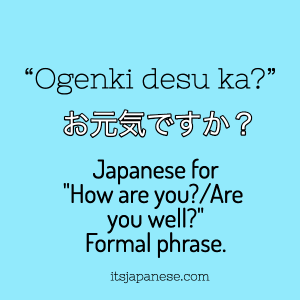Want to know how to say how are you in Japanese?
Wait.
Did you KNOW that asking someone “how are you?” in Japanese conversations is NOT common?
Asking someone is a simple greeting used in English and it is a good conversation opener when we want to be polite. But… that’s English!
How about Japanese?
Despite Japanese being a polite language with many honorifics, asking someone “how are you?” in conversations is not common. Asking someone “how are you?” is considered a little too direct or unnatural.
Either way, I won’t let you down. There are ways to say How are You in Japanese.
Keep reading.
And you’ll discover WHY people don’t often ask this question in Japanese.
1. “Ogenki desu ka?”
- お元気ですか?
The o genki desu ka meaning is just “how are you” or “are you well?”
This is the literal and formal way to say how are you in Japanese.

Now, how about the o genki desu ka words broken down?
- The word “genki” simply means “lively” or “well.”
- The “O” before it makes it polite.
- “Desu” can have a whole essay written about it but keep it simple and think of it as the verb “is” (am, are, etc.).
- The “ka” turns the statement into a questionl
By the way, if you want to hear this phrase in ACTION…
Be sure to listen to this audio lesson from JapanesePod101 on saying how are you in Japanese. By the way, you can get even more FREE lessons like this at JapanesePod101.com (click here).
This phrase embodies the cultural emphasis on politeness and genuine concern for others’ well-being and overall condition.
Though, as mentioned, it is not commonly used as an equivalent of “ how are you?” in an English conversation, it can be used on some occasions.
One such occasion is when you are writing a letter. Using the phrase “Ogenki desuka?” in a written form is very common and natural.
Another occasion is when you are asking about someone close to the person whom you are having a conversation with. For instance, when you wish to ask about the person’s father or mother, we can use “Otōsan wa ogenki desu ka?”( お父さんはお元気ですか?) “okāsan wa ogenki desu ka?”(お母さんはお元気ですか?)(Of course, Otōsan means father and okāsan means mother.)
Considering these, one of the reasons that we Japanese do not use this phrase in conversation is that if you can meet someone face-to-face, it is evident that the person is physically well.
Other details, like the status of someone’s mental health, are considered too private to share in casual conversation.
Therefore asking the person in front of you “how are you?” is not natural, but asking about someone who is not present sounds totally natural.
Now, we will look at what kind of occasion we can ask about someone’s health or how are they feeing.
2. “Okarada no guai wa ikaga desuka?”
- お体の具合は 如何ですか?
Let’s say you already knew that this person was not feeling well before or was just discharged from hospital.
Then, you can ask them by saying “ Okarada no guai wa ikaga desuka?”
“karada” (体)means body, and we place “O” in front of the “karada” to make it polite.
“Ikaga desuka?” (如何ですか?)is polite form of “Dō desuka?” (どうですか?)and both mean “ how is it?”
If you have knowledge of the person’s condition beforehand, it is not rude nor too direct to ask about their condition using this phrase.
3. “ Taichō wa dō?”
- 体調はどう?
Also…
- “Taichō wa dō desuka?”(体調はどうですか?)
If someone looks like he/she isn’t feeling so well, and you’ve known this person for a while (not the first time meeting ), you can ask using the phrase “ Taichō wa dō?”(体調はどう?) or “Taichō wa dō desuka?”(体調はどうですか?)
Taichō (体調) means “physical condition or state of health”.
“Dō” (どう)can be translated as “how”.
When you add “desu ka?” to the phrase, it becomes more polite. Plus, the “ka” is the question marketing particle, which is how to ask questions in Japanese.
4. 3 Ways of Responding
1. “Hai, genki desu” (はい、元気です) – “Yes, I’m well.”
Essentially how to say I am fine in Japanese.
This is a straightforward and commonly used response to indicate that you or the person are doing well.
2. “Okagesama de genki desu” (お陰様で元気です) – “Thanks to you, I’m fine.”
“Okagesama” means “thanks to you” therefore expressing gratitude and acknowledging the support or influence of the person asking. You can just use “Okagesamade” only, this already can imply that you are doing well.
3. “Maa maa desu” (まあまあです) – “I’m okay.”
“Maa Maa” means “so so” but it is common to express your condition in this way as a moderate or neutral state of well-being. Using this phrase is more common than saying “Genki desu.”( 元気です), as Japanese prefer to use a more modest expression.
Read This Last
Now you know some basic ways to say how are you in Japanese.
The most common of all is
It is important to remember to ask or respond in a manner that aligns with the level of familiarity and formality in your relationship with the person whom you are interacting with.
Knowing cultural nuance is important as well. Asking “how are you?” in Japanese is one example where direct translation would not work well in the conversation.
Team IJ
